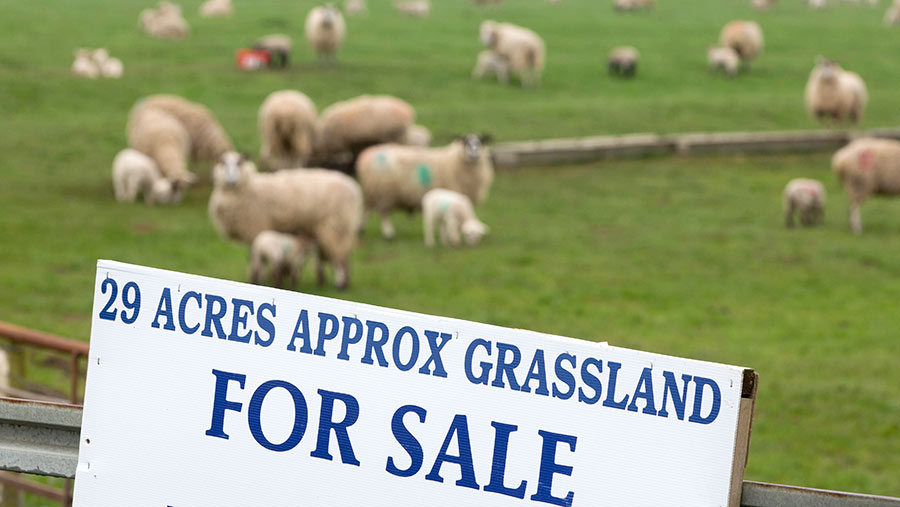Sales of land in support schemes: What farmers should know
 © Tim Scrivener
© Tim Scrivener Land that has been included in a farm business’s support scheme application or agreement is subject to specific rules that must be followed during the transaction process to avoid financial consequences.
Here are the main issues that buyers and sellers need to be aware of in England.
See also: Countryside Stewardship 2021: What farmers need to know
Key advice
- Check which schemes the seller has been involved with
- Gather all relevant paperwork and information from the seller well in advance
- Be clear in sales particulars about what is expected – for example, the buyer must take on the agri-environment agreement or that there are entitlements being transferred
- Make sure the buyer is aware of scheme requirements affecting the land
Basic Payment Scheme (BPS)
Land eligibility
Land used to claim BPS in 2021 must remain eligible until 31 December 2021 – it’s not a single-day assessment on application deadline day.
This means land must be:
- an agricultural area – arable land (including temporary grassland and fallow), permanent grassland or permanent crops; and
- primarily used for an agricultural activity – producing, rearing or growing agricultural products, or keeping land in a state suitable for grazing or cultivation.
If non-agricultural activity significantly interferes with agricultural activity, the land won’t meet the BPS eligibility rules.
The buyer may be purchasing land for non-agricultural purposes, such as housing development.
If so, and the land was included on the seller’s BPS 2021 application, it may need to be withdrawn from the application.
If it isn’t withdrawn, over-declaration penalties may be applied to the seller’s payment, even if the buyer’s actions have caused the land to become ineligible.
Transferring entitlements
If BPS entitlements are also being sold with land, check the number and payment region on the seller’s Rural Payments service account (www.gov.uk/ruralpayments).
Currently, entitlements can only be transferred using an RLE1 form. The online transfer function was switched off on 18 May and won’t be available again until early 2022.
If sale funds won’t be released until the Rural Payments Agency (RPA) confirms the transfer, bear in mind that confirmation won’t be received until the RLE1 form is processed – it’s not immediate, as it is with online transfers.
Agri-environment scheme agreements
Transferring agreements
If an agri-environment scheme agreement is involved – either Countryside Stewardship (CS) or Environmental Stewardship (ES) – be clear whether or not the buyer is expected to take it on.
It’s only possible to transfer CS multi-annual management option agreements, not any claimed capital works element or standalone capital agreements.
The buyer effectively steps into the seller’s shoes and must deliver the existing CS agreement requirements.
The appropriate paperwork must be submitted to the RPA within 90 days of the land being transferred.
If the buyer won’t be taking on the CS agreement, the RPA can terminate it, provided the seller completes the required paperwork within the 90-day limit.
In that case, the seller doesn’t have to repay revenue payments received while they still occupied the land, unless there’s been a breach.
This differs for ES agreements, where the seller may have to repay monies received.
Outstanding revenue claim payments
For a sale completion after 17 May 2021, the seller should have submitted the CS revenue claim.
However, if the CS agreement is transferred later in the year, outstanding CS revenue claim payments will be made to the buyer, despite the seller delivering the requirements until the land was transferred.
Cross-compliance
The cross-compliance rules must be met by anyone claiming rural payments such as BPS and CS.
The rules apply from 1 January to 31 December across the whole of the holding and all agricultural activities.
There are specific provisions around who’s responsible for meeting these rules if land is transferred and how penalties apply.
For land transferred after 17 May 2021, if the buyer claimed rural payments on other land in 2021, they are responsible for meeting the cross-compliance rules on the purchased land for the rest of the year.
However, if the buyer wasn’t a rural payments claimant on other land in 2021, the seller remains responsible for ensuring the buyer meets the cross-compliance rules on the transferred land for the rest of the year.
If the buyer breaches the rules, payment reductions will be applied on the seller’s claims.
